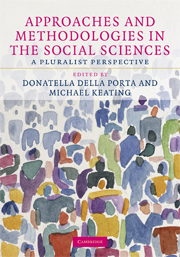Book contents
- Frontmatter
- Contents
- List of figures
- List of tables
- Contributors
- Preface
- 1 Introduction
- Part I Epistemology and philosophy of the social sciences
- 2 How many approaches in the social sciences? An epistemological introduction
- 3 Normative political theory and empirical research
- 4 Causal explanation
- 5 Constructivism: what it is (not) and how it matters
- 6 Culture and social science
- 7 Historical institutionalism
- 8 Game theory
- 9 Rationality and recognition
- Part II Research design
- References
- Glossary
- Index
3 - Normative political theory and empirical research
Published online by Cambridge University Press: 05 June 2012
- Frontmatter
- Contents
- List of figures
- List of tables
- Contributors
- Preface
- 1 Introduction
- Part I Epistemology and philosophy of the social sciences
- 2 How many approaches in the social sciences? An epistemological introduction
- 3 Normative political theory and empirical research
- 4 Causal explanation
- 5 Constructivism: what it is (not) and how it matters
- 6 Culture and social science
- 7 Historical institutionalism
- 8 Game theory
- 9 Rationality and recognition
- Part II Research design
- References
- Glossary
- Index
Summary
Introduction
Normative theory and empirical research have become separate branches of social science. Yet, as I will suggest, empirical research can be guided by normative theory; and normative theory can be improved by empirical research. This is not always well done. Empirical researchers resort too often to ad hoc normative assumptions. On the other side, some theorists studying social problems still rely on hypothetical arguments in spite of available empirical evidence, while others interpret empirical research naïvely without the necessary critical knowledge (Favell and Modood 2003).
We should not, moreover, erase the difference altogether. Normative problems can never be fully resolved through analytical explanation or hermeneutical interpretation, nor can deep disagreement within normative theory be overcome by testing the empirical presuppositions. The goal of a unified political theory is not merely illusory but profoundly misunderstands the nature of this enterprise. Normative political theory mirrors political disagreements among citizens that cannot be resolved through conceptual analysis nor by inference from empirical evidence, but only through politics itself. The contribution of political theory to political debates is not to settle disputes but to clarify arguments and to highlight the values involved in political choices. Such theory should be supported by social science research to specify the realworld conditions and consequences of the choices that its normative propositions advocate.
- Type
- Chapter
- Information
- Approaches and Methodologies in the Social SciencesA Pluralist Perspective, pp. 40 - 60Publisher: Cambridge University PressPrint publication year: 2008
- 17
- Cited by

